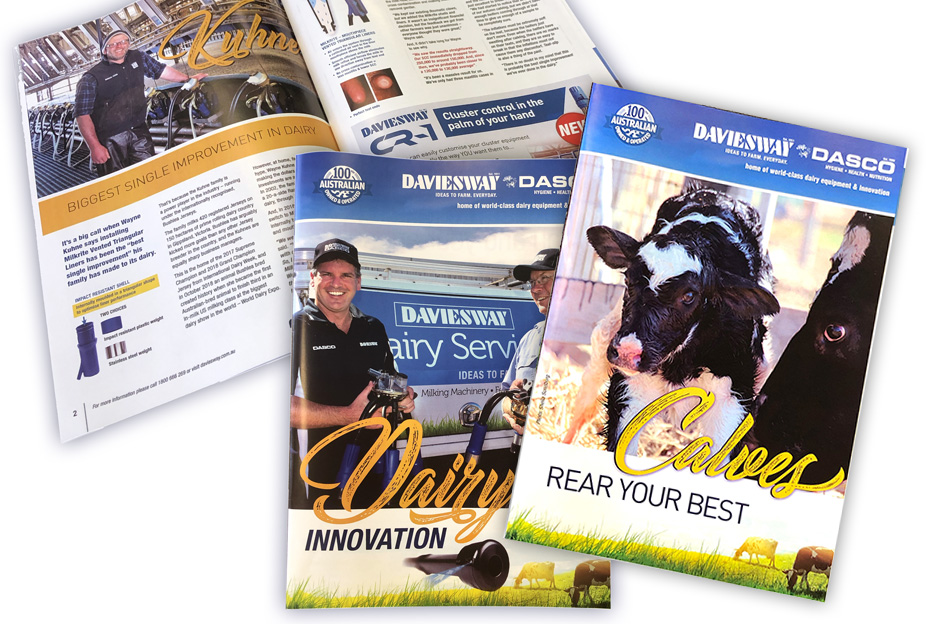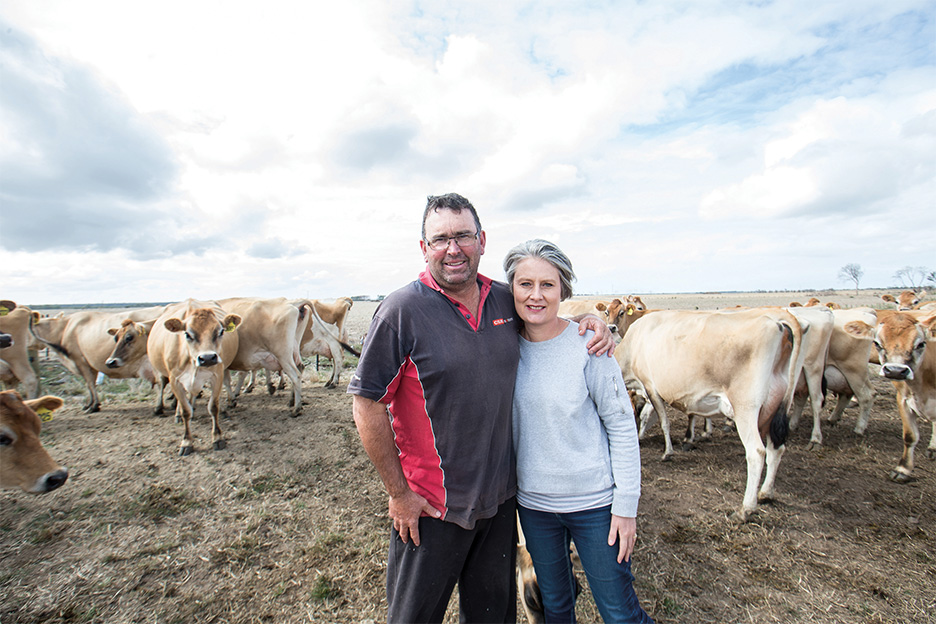
It was the phone call every dairy farmer dreads when they are off-farm.
Brad and Jill Porter were milking 600 cows at Panmure Jerseys, just out of Warrnambool in south-west Victoria. On March 17, 2018, they were in Tasmania for a short break when their neighbour, Jack Kenna, rang. He said a power pole had fallen on his farm, ignited a fire and it was headed their way. He said they had three minutes to get out.
There was no time to do anything. The flames, propelled by the hot windy temperatures and a lot of fuel, would wreak unspeakable destruction within 30 minutes – including killing or maiming 400 of their herd. Cows which Brad adored. The life-changing event was to be so catastrophic and traumatic on so many levels that it still haunts them both today.
Both Jill and Brad have become fierce advocates for change, board members for Blaze Aid, and they have advice and life lessons – that they wish they had never had to learn – for their colleagues facing up to their own recoveries after the recent bushfires across Australia…
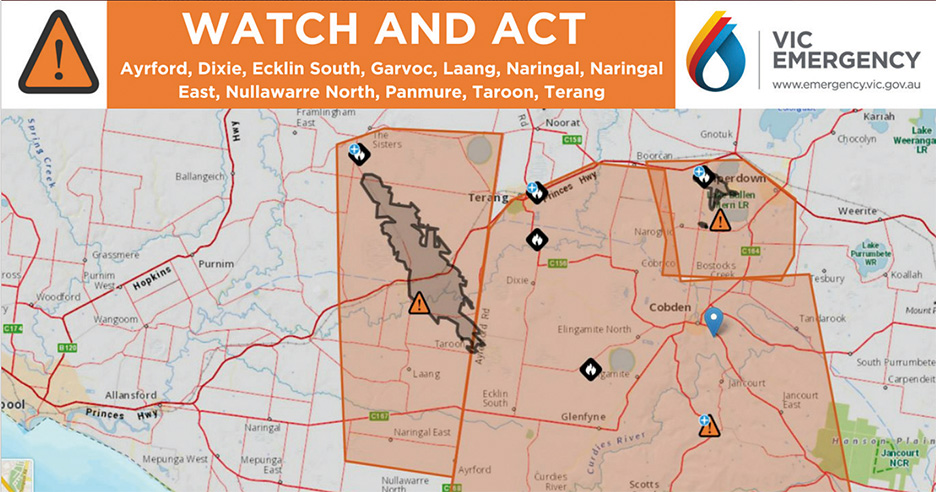
Brad and Jill (who was still in her pyjamas) rushed to the airport. They left their rental car sitting in the middle of the drop-off zone, and sprinted for the ticketing counter. They managed to bag the last flight out of Tasmania. The airline put them in the front seats, giving them the best chance of a rapid exit when they landed.
The Porters arrived home at 3am and immediately started checking the cows. Jill, a pharmacist, stepped into her professional role to help assess and triage the herd. As the sun rose, the depth of the carnage became clear. They wouldn’t go to bed for the next three days.
Brad said, “There were the dead, the walking dead, the severely burned cows, the burned cows, and the cows that were okay. The fences were all gone, and the cows were in shock. So were we. One side of the farm wasn’t as bad, and we could put all the other animals over there so we could concentrate on the herd.
“We assessed all the cows and we had to get a number destroyed immediately, and we were forced to sell a large number of cows that were burned, but saleable.
“Some things you just can’t un-see. And, I don’t want to ever see what we saw that day ever again.”
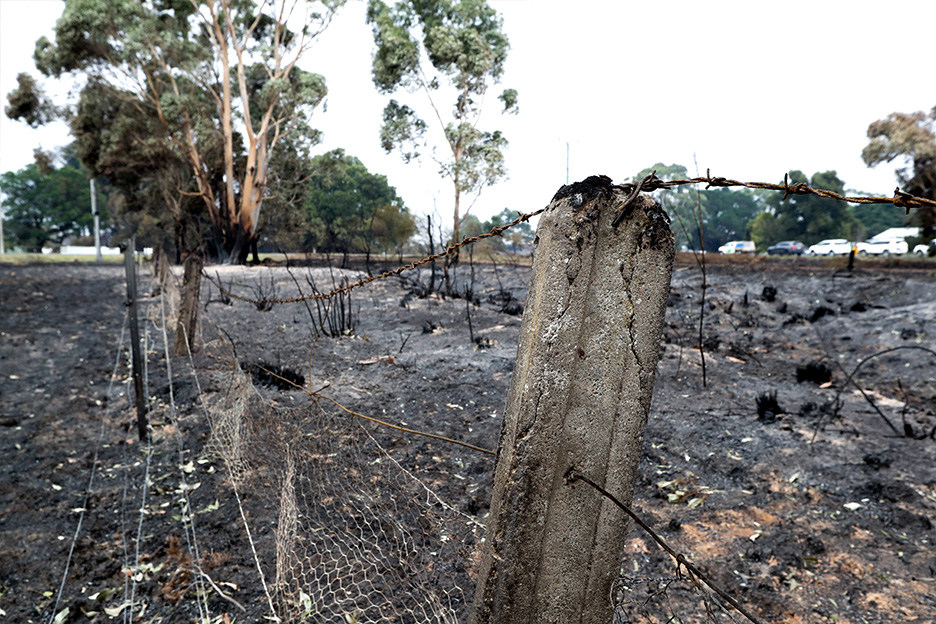
Six fires, which were all started by electrical failures on St Patrick's Day in 2018, collectively burned 40,000 hectares. Photo: The Warrnambool Standard.
‘I WOULDN’T HAVE MY HUSBAND’
Jill’s life has also changed in the aftermath, and she is sure of one thing.
“I wouldn’t have my husband today, if we had been home,” she said without a pause of hesitation. “He would have died defending those cows. Every day I get up now and look at him and think, ‘Thank God, we weren’t there’.
“I can still see in my mind’s eye a cow who was burned … with her nose half peeling off. And she just stood and looked at me. I couldn’t help her, and I couldn’t protect my husband from seeing her. He knew every cow. He loved them all. Those memories remain very raw. I struggle to go to the dairy even today if it’s hot and windy.”
Brad still hasn’t had the heart to check the computer thoroughly to update his records on the cows which survived. Because he knows he will also see the ones that didn't.
“I don’t even think about how many cows we’ve lost, and that’s why I haven’t gone back into the computer since the fire. I just block it out. It’s for my own mental preservation.”
RUNNING TO FIND PEACE
The fire was caused by a power company’s ageing infrastructure – with nothing the Porters, their neighbour Jack Kenna, or any other neighbour could do about it. The bitter pill to swallow is that was preventable. The result has been lengthy and engulfing litigation that threatened to swallow Jill. She was so enraged by the injustice of that day, that her counsellor advised her to take up a sport.
“I am not into sport at all, so I started walking,” Jill said. “But it was too slow because I was so angry, so I started running.”
How far does she run? “Until I feel good.” It could take 19 kilometres to achieve peace. It depends on the morning. Jill didn’t work off-farm again for 18 months.
DAILY, INTENSIVE TREATMENT
Brad still tears up when he thinks about the cows and the suffering they went through.
One of the first things the Porters needed to do after the fire was to get the cows through the dairy. It was akin to a war zone: so many of the herd were injured and in pain. So many needed treatment every milking.
Neighbours and friends pitched in. There was a kindness and solidarity that Brad and Jill will never forget. For about six months afterwards they were feeding up to 150 people every lunchtime.
MILKING HEALTH FOCUS SAVED COWS
Brad said they considered drying the herd off, but he needed the routine to make him get out of bed every morning.
“We needed the income as well. But mostly I needed my usual routine to maintain my sanity. I think it helps with making decisions.”
One of the first post-fire orders of business was the dairy. The clusters and liners, which had concerned Brad in the past, were now causing havoc.
“The cows’ teats were weeping, and their skin was so thin and so tender. We were so worried about stripping all the skin off the teats because we had really bad cup slippage. We needed cups and liners that were gentler on the teats.
“For the health and comfort of the cows we didn’t have a choice. There was no running away from it. We would have lost so many more cows if we hadn’t done something, and we knew it had to happen fast.”
He made an SOS call on the Thursday to Mick Scanlon of Scanlons Dairy Centre in Terang, who in turn contacted Leon Lourey from Daviesway. By the Saturday, a full install of new Milkrite clusters (complete with triangular vented liners) was completed. They chose Milkrite because the science behind the design gives cows the highest level of comfort (they have the world’s only internally triangular moulded plastic shell with mouthpiece vented triangular liners).
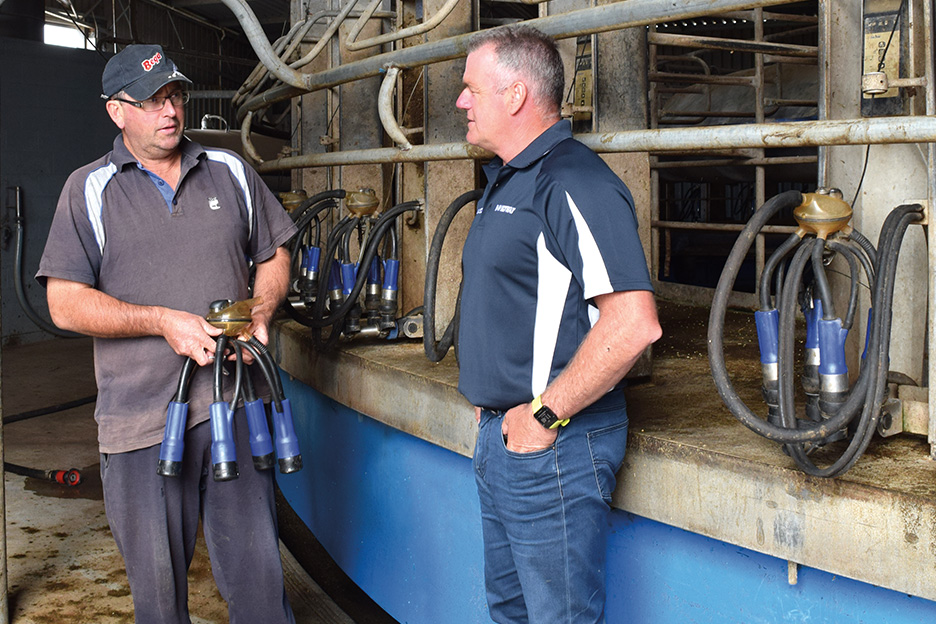
Brad Porter (left) told Daviesway's Leon Lourey that Milkrite helped save cows
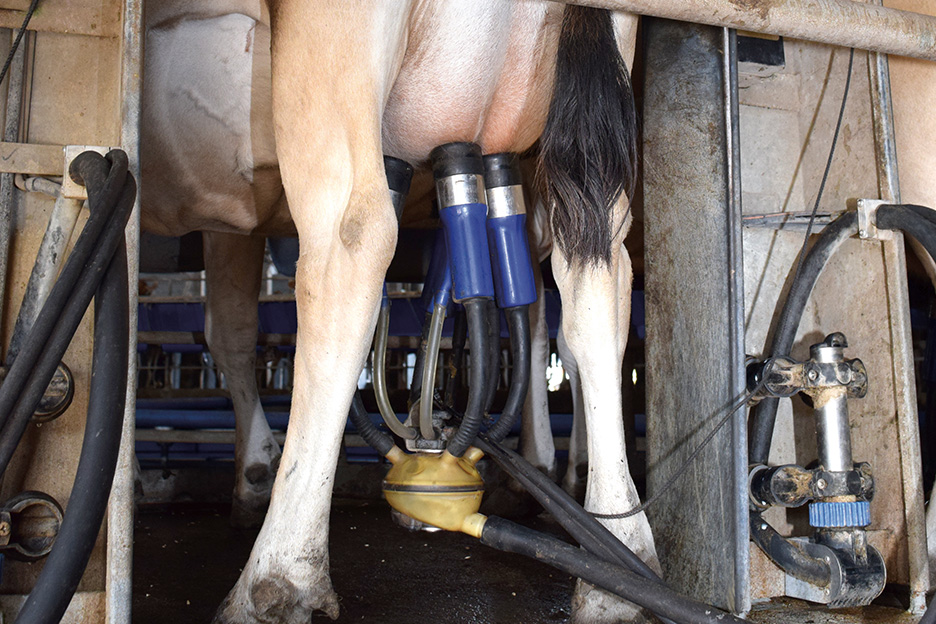
Teat-end damage is a thing of the past for the Porters. Milkrite mouthpiece vented triangular liners – For more information Click here
TEAM WORKS WITH FARMERS
Leon said the whole team made it happen.
“Knowing the circumstances, we just knew we had to do something as quickly as we could,” Leon said. “Mick was also a big part of it. Our sole focus was to help in any way we could.”
Brad said it was a life-saving decision.
“Most of the cows’ udders were burned. The teat orifices on a lot were fine, but we would have lost the entire herd with that cup slippage. We needed cups that hung on, but which were gentle.”
Milkrite, which is used by 40% of farmers in the USA, includes a patented and revolutionary air-vent position in the mouthpiece of each liner. It introduces air above the milk-flow, stops splash-back and makes cluster removal gentler.
“I was so delighted and relieved with the result,” Brad said. “The clusters were much lighter, and much easier to use.
“I was a real sceptic about the air hole in the mouthpiece of the liner – I thought it’d get clogged up with shit – but it hasn’t been an issue. “I’d be happy to stand on the corner of the street and sell Milkrite to anyone who would listen.
“They milk cows out properly, they are much gentler on their teats. We haven’t seen any teat-end damage in the last two years and that’s been a big thing for me because I can’t afford to lose anymore cows. I wouldn’t dare put my name to it if I didn’t think it was worthy.”
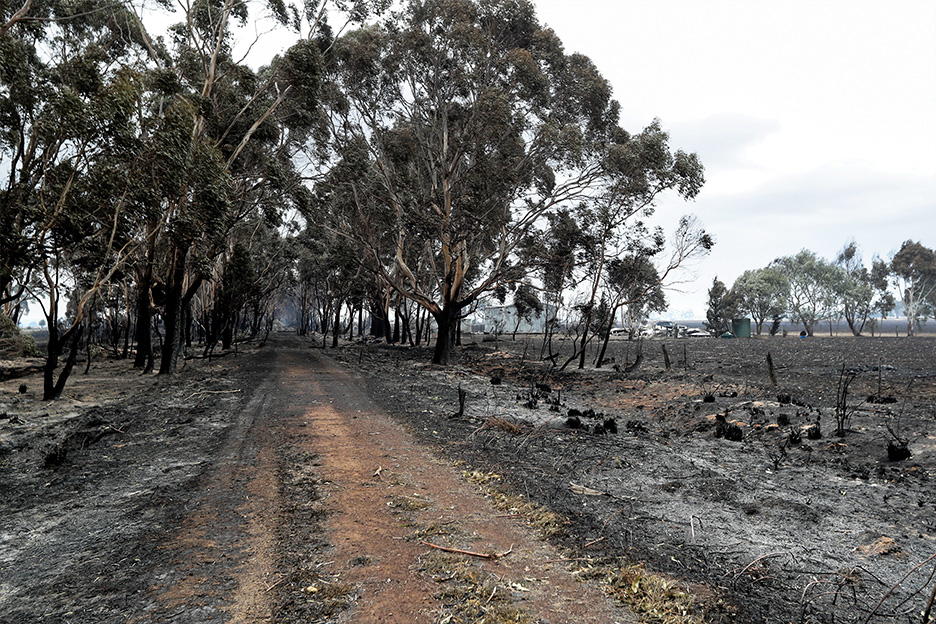
80% OF BUSHFIRES PREVENTABLE
What now haunts Jill is that her research has revealed that more than 80% of the bushfire deaths in Victoria can be traced to electrical failures. Energy Safe Victoria (ESV) has determined that Powercor failed to identify the termite-riddled power pole which razed Brad and Jill’s property. That day six fires – all started by electrical failures – burned 40,000 hectares.
“These fires are really deadly. If you look at Black Saturday [February 7, 2009], six out of the 11 fires were electrically initiated. On Ash Wednesday [February 16, 1983] five from the eight were ignited by electrical failure. All of the 1977 fires [that burned about 103,000ha] were electrically started.
“On the day of our fire, all were started from electrical infrastructure failing. Every single one of them. And, it’s because the infrastructure is aging and it’s failing our community.”
Jill has been fighting for change ever since because their community’s pain remains real and raw.
“I think the biggest thing is I’m devastated that a Government and a system can let a community down like we’ve been let down. We deserve to be safe. That is not happening.
“Yes, we got a civil settlement, but they are now arguing about what they should and shouldn’t pay for. They’re still in the driver’s seat. They destroyed my husband, and you can’t get that back.
“His passion and his livelihood was gone. I can articulate that, and I’ll continue to take it to them. Because they are wrong, they are indecent, and they are cruel.”
PEOPLE WERE THE DIFFERENCE
Day-to-day their community’s resilience has been the shining star to come out of the experience.
Jill said, “We are still a long way from recovered. I’m not saying we’re not functioning. I’m back now, but it took me 18 months to go back to work.
“You listen to the psychologists and it takes an average of six years to recover from a bushfire. You’re not ‘right’, even when the grass is green again because everything changes. It rips you apart.
“People talk in terms of ‘getting back to where you were before the fire’. It’s very much the catch phrase in recovery. I’m absolutely certain that you never get back to where you were because the recovery takes you down a different pathway.
“It’s not all bad. There are some good things – people’s generosity and support of us is something Brad and I hope to pay forward.
“Our neighbours and community that were burned out have become very resilient, and we know each other on a much deeper level because of the fire.” Brad said it had been a humbling experience, and it had been hard to accept help. But people had made the difference
“I remember walking out the door after the fire and thinking, ‘where do I start?’. People came from everywhere.
“It was a generosity you never, ever forget. It pays to be charitable in life. I would walk over hot coals for my neighbours – there are so many people I have such a high and healthy respect for in my neighbourhood. At the end of the day, they’re the ones that got us back up on our feet.”
Jill said her advice to peers now facing their own recovery in the wake of the most recent fires was to take care of each other, and not to be afraid to ask for help.
“It takes a long time to come out of the fog, and you don’t need to rush it. You have to attend to certain things straight away, but you don’t want to make too many decisions unless you have to.
“There are a lot of good people in this world, and you’re not on your own.”
Daviesway Contact – Leon Lourey: 0457 847 139 or
Milkrite mouthpiece vented triangular liners – For more information Click here
Download print version – DAVIESWAY / DASCO 2020 Magazine
![]() 02 – Australian Farm stories: Milkrite Triangular Vented Liners
02 – Australian Farm stories: Milkrite Triangular Vented Liners

